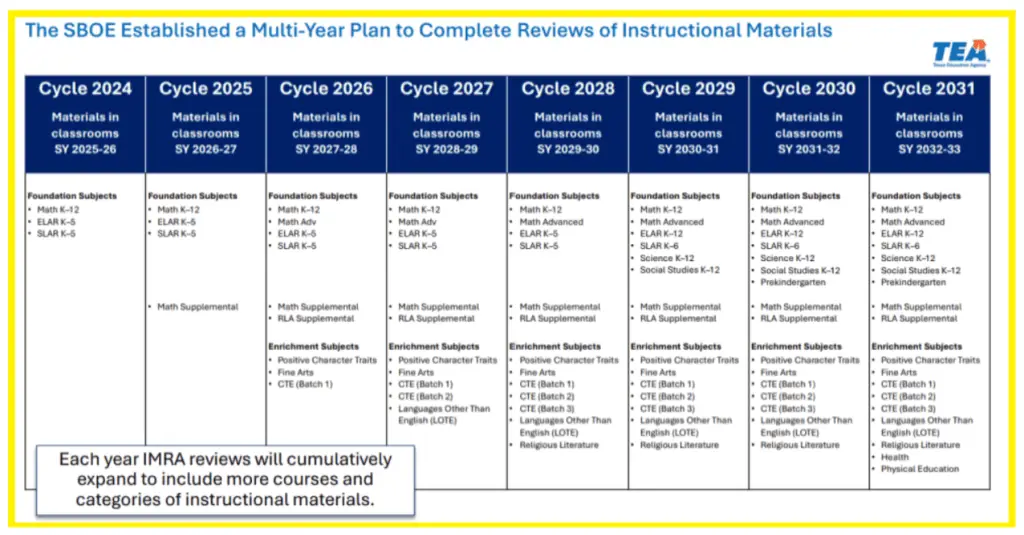13 Impacts: Guide to HB 1605 for Teachers
Who wants to read dozens of pages on new curriculum laws? Probably not you! That’s why we distilled House Bill 1605 (HB 1605) for teachers to digest in a quick, friendly guide. Let’s jump in.
1. HB 1605 for Teachers: Ready-Made Lesson Plans in HQIM
Pre-Written Lesson Plans Count
- Brief Lesson Plans: Districts have typically required short, written lesson plans.
- Good News: Under HB 1605, if your district adopts High-Quality Instructional Materials (HQIM) that already include weekly or unit lesson plans, that can count as your required lesson plan.
- In Practice: This means less duplicative work—no more rewriting the same plans if they’re already part of your district-approved materials!
2. HB 1605 for Teachers: Training in Educator Prep Programs
Accessing SBOE-Approved OER
- New Requirement: Educator prep programs must show teachers-in-training how to access open resource materials (OER) that end up on the State Board of Education (SBOE) approved list.
- Why It Matters: Whether you’re a brand-new teacher or a mentor, you’ll see more OER in your curriculum. This requirement ensures teachers can easily find and use those free, high-quality resources.
3. HB 1605 for Teachers: Planning & Noninstructional Duties
Supplemental Agreements for Extra Tasks
- Teacher Planning Time Protected: HB 1605 restricts districts from requiring you to do major lesson design or instructional material selection during your planning—unless every teacher has to do it equally.
- Opt In If You Want: If the district wants you to handle extra tasks (like creating new units or picking specific materials), they must offer a supplemental agreement that lists exactly what you’ll do.
- Clarity: No hidden tasks! If you sign one, the extra duties must be spelled out—and you get the option to say yes or no.
4. HB 1605 for Teachers: Teacher Immunity from Disciplinary Action
Fidelity to SBOE-Approved Materials
- Shield from Lawsuits: If you faithfully use instructional materials approved by the district and on the SBOE-approved list, HB 1605 grants you immunity from certain disciplinary proceedings.
- Practical Example: If someone alleges you violated federal law (like the First Amendment’s Establishment Clause) purely because of the material’s content, you’re protected as long as you delivered it as intended.
5. HB 1605 for Teachers: Parent Access to Teaching Materials
Online Portal & In-Person Viewing
- At Least 30 Days: Districts must let parents see most teaching materials (except future tests/exams or not-yet-administered ones) 30 days before school starts until 30 days after it ends.
- Parent Portal: HQIM or publishers on the SBOE list must host an online portal for parents to browse. Teachers are not required to upload their self-made materials here, unless they want to.
6. HB 1605 for Teachers: Right to Request an Instructional Material Review
Petitions & Board Reviews
- If ≥ 25% of parents at a campus want a review of that campus’s materials, the school board must do it—unless fewer than 50% signed, and the board majority votes to deny.
- Limit: The board isn’t forced to do multiple reviews for the same subject or grade in one school year.
- Vocabulary List & Literary Works: The SBOE must pick a list of required vocabulary and at least one literary work per grade level in ELA.
- Teacher Freedom: You can still teach more works beyond that one, but the SBOE’s picks are the minimum requirement.
No Penalization for Pacing
- HB 1605 prohibits districts from penalizing teachers who don’t perfectly follow the pacing in the district’s scope/sequence or instructional materials. You have flexibility to adjust lessons for student needs.
9. HB 1605 for Teachers: Reading Standards for K–3
No Three-Cueing
- HB 1605 bans three-cueing methods (guessing words by context) from phonics curricula in K–3. Expect a continued focus on phonics-based reading strategies.
10. HB 1605 for Teachers: OER (Open Educational Resources) & State Allotments
Reproduction & Allotment Funds
- State Instructional Materials & Technology Fund can now pay for printing OER.
- District Accounts: TEA will maintain an online requisition system. Districts use their Instructional Materials & Technology Allotment (IMTA) for basically any materials (minus obscene/harmful content).
TEA’s Direct Contracts
- Agency Purchases: TEA can sign deals with publishers for statewide materials, which districts can then use. You don’t have to adopt them, but they’ll be readily available.
11. HB 1605 for Teachers: Instructional Materials Review & Approval
SBOE & TEA Oversight
- Quality Check: SBOE reviews TEA-vetted materials to ensure they’re error-free, suitable, and meet TEKS.
- May Reject: SBOE can put unapproved materials on a rejected list or remove old ones if the TEKS change, or if the publisher revises content without approval.
12. HB 1605 for Teachers: Local Review of Classroom Materials
The 30-Minute Rule
- TEA must develop standards so if your district wants to “locally review” teacher-chosen resources as supplements to district-adopted HQIM, you won’t spend more than 30 minutes per review—unless unavoidable.
- One & Done: The same grade/subject set of materials shouldn’t be reviewed more than once a year.
- Local Classroom Review: Though not explicitly stated in HB 1605, many districts may decide to review any teacher-created materials used in the classroom, even outside of foundational courses. Why? The TX SBOE and TEA have not yet adopted curriculums for certain foundational courses, but they will. They intend to adopt state-approved instructional materials for most courses between now and 2031. So it’s clear that while HQIMs are being promoted as rigorous and their use freeing for teachers, implicit in this argument is that teacher-created materials don’t meet state standards. At least that’s how district leaders may see it, so be ready for more encompassing local review processes put into place for all teacher-created class materials.
13. HB 1605 for Teachers: OER Availability & Advisory Board
Bluebonnet Learning Now Available
- K–5 & PK–8: TEA is now making free OER materials available to teachers, parents, and students (besides printing/shipping costs). The SBOE approved TEA’s Bluebonnet Learning for Math K-8 + Algebra 1 and ELAR for K-5 on November 22, 2024. The Bluebonnet name will be used on the adopted OERs planned through 2031.
- Transition Support: Districts adopting OER for the first time must have a transition plan, ensuring teachers get enough training and maintain flexibility in how they use OER.

Wrapping Up
HB 1605 strives to streamline a teacher’s workload (pre-written lesson plans + optional supplemental agreements), protect you from certain disciplinary or legal challenges, and expand parent awareness of classroom content. It also invests in Open Educational Resources—giving districts more freebies—and clarifies that you can’t be punished just for pacing things differently.
Quick Takeaways of HB 1605 for Teachers
- Use State-Approved, District-Adopted HQIM: It might count as your official lesson plan.
- Opt-In to Extra Duties: You can say “no thanks” if you don’t want to create extra materials.
- Immunity: If you stick to SBOE/district-approved materials, you’re safer from legal trouble.
- Local Reviews: District reviews can’t bog you down; your district administration must keep it short. Be ready for new local review processes for any teacher-created curriculum and supplemental materials.
- Parent Portal: Only core, approved materials must appear. Your personal supplements don’t require uploading (unless you choose to).
- No More Three-Cueing in K–3: Embrace phonics all the way.
With so many updates, it’s no wonder teachers sometimes feel swamped. But hopefully, HB 1605 helps you focus on teaching rather than red tape—especially if your district picks strong HQIM or the OER Bluebonnet Learning materials. As always, check your local board policy and watch for TEA guidance for specifics on how it plays out in your classroom. You may also want to visit the Texas Classroom Teachers Association for more information.
Now you’re in the know—no need to slog through the legislation yourself!
1. How does HB 1605 reduce lesson planning work for teachers?
HB 1605 allows district-adopted High-Quality Instructional Materials (HQIM) that include unit or weekly plans to count as official lesson plans. This reduces duplicative planning and eliminates the need to rewrite plans already embedded in approved curriculum, giving teachers back valuable instructional and preparation time.
2. What protections does HB 1605 give teachers when using approved materials?
HB 1605 grants teachers immunity from certain disciplinary actions when they faithfully use district-adopted, SBOE-approved instructional materials. If complaints arise—such as alleged constitutional violations—teachers are protected as long as they deliver the materials as approved, reducing professional and legal risk.
3. Can districts require teachers to take on extra planning or curriculum work?
Districts may not require major lesson design or material selection beyond normal duties unless teachers opt in through a supplemental agreement. These agreements must clearly list all extra duties, giving teachers transparency and the ability to accept or decline additional responsibilities without pressure.
4. How does HB 1605 affect instructional materials reviews and pacing flexibility?
HB 1605 prevents districts from penalizing teachers for pacing differences and limits local instructional material reviews to 30 minutes per submission when possible. This protects instructional autonomy while ensuring materials meet standards set by the Texas Education Agency and the State Board of Education.
Further References
- Texas Legislature Online
capitol.texas.gov
(Search “HB 1605” for the bill text, official summaries, and legislative history.) - TEA Instructional Materials
tea.texas.gov/academics/instructional-materials
(Watch for emerging rules on local review standards, OER expansions, etc.) - District Policy
EF(LOCAL) or EFA(LOCAL) may detail how your district implements the new planning requirements, local reviews, and parent portal.

